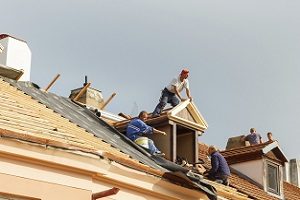
Protecting Your Roofing Contractor Clients
By Jamie Lewis, Senior Vice President
As you review your book of artisan and trade contractors, it is important to keep in mind the potential pollution exposures that your insureds may have. HVAC contractors, plumbers, electricians, painters, and roofing contractors are just a few examples of clients you may have on the books that would not necessarily be considered an “environmental contractor,” but certainly have pollution exposures as a part of their normal scope of services.
A roofing contractor is a prime example of an insured that does not perform environmental contracting services, but has multiple exposures for pollution-related losses and would be a good candidate for Contractors Pollution Liability coverage. Sealants, adhesives, coatings, and other products used to spray, seal, or repair roofing systems can often be toxic if inhaled. If a contractor fails to properly close off or turn off the HVAC system or properly ventilate the building, fumes from these products can be extremely harmful to the individuals exposed to them within the building. The Pollution Exclusion within the insured’s General Liability policy is not likely to cover a Bodily Injury or Property Damage claim in this scenario, as most GL policies will exclude this type of claim arising from the discharge, dispersal, seepage, migration, release, or escape of a pollutant, such as fumes from one of the products used by the roofing contractor. The contractor could also face a Loss of Use claim if the building were deemed unusable for an extended period of time.
In a recent claim, a contractor installed a new roof at a 250,000 square foot office building and shopping center. The roofing material decomposed and caused a chemical reaction, emitting fumes into the office building. The contractor faced a $400,000 property damage and Loss of Use claim.
Improper disposal of materials and products used by a roofing contractor during or upon completion of a project could also result in a pollution loss that will most likely be excluded by a GL policy. If not disposed of properly, toxic products and used materials can cause contamination to land and/or groundwater. The clean up costs and property damage claim amounts can be extensive.
Roofing contractors are susceptible to other pollution related claims, such as mold, without the use of harmful or toxic products. By simply improperly installing a roofing system, the risk of water intrusion into a structure increases, ultimately increasing the chances of mold growth. Water entering the roofing system and structure can collect and create an ideal environmental for mold, which can be harmful to individuals within the building. The cost for locating and remediating mold can also be extensive as the structure will need to be thoroughly inspected to remove and prevent any moisture that could cause re-growth. Simple defects in the installation or repair of a roofing system can cause large pollution related losses for your insured.
A Contractors Pollution Liability policy would provide coverage to a roofing contactor for Bodily Injury and Property Damage claims in the event of a pollution condition, which is usually described as a release of contaminants, chemicals, hazardous substances and materials, or waste materials onto the land, the atmosphere, surface water or groundwater. In some policy forms, mold is included within the definition of a “Pollutant” or can be added via endorsement. Professional Liability coverage can often be added for supervision of subcontractors and/or Professional Liability exposures, such as construction management and job site/design modifications. Additional coverage options that can be added to CPL policies are Transportation Pollution Liability, Non-Owned Disposal Site, Natural Resource Damages, Blanket Additional Insured, and Waiver of Subrogation endorsements.
Make sure your roofing contractors know about their exposures and understand what is, and isn’t, covered in their policies. By educating them on the insurance products available, you will help protect them from potential claims, and also strengthen your relationship with them.
For more information on roofing contractors or environmental insurance coverage, contact us.
Learn more about insurance for contractors.
Type: Blog
Topic: roofer